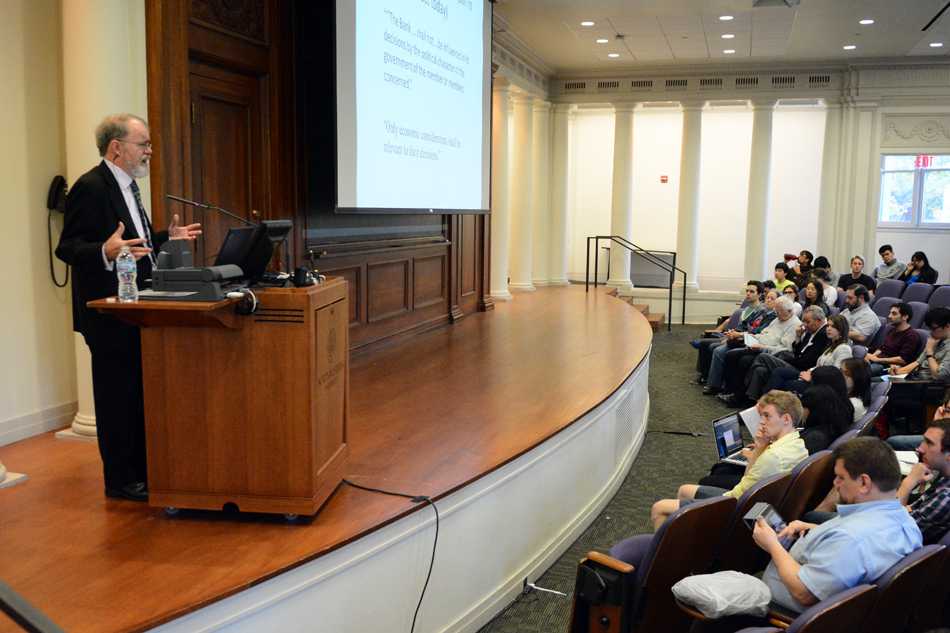Economist, author talks international development, aid policies
Nathan Richards/Daily Senior Staffer
New York University economics Prof. William Easterly gives a talk at Harris Hall on Thursday night. The lecture, part of the One Book One Northwestern program, discussed the problems with the organization of economic development around the world.
May 22, 2014
An economist and author spoke Wednesday on human rights and foreign aid in a talk titled, “The Tyranny of Experts: Economists, Dictators and the Forgotten Rights of the Poor,” based on his book of the same name.
The event, co-sponsored by One Book One Northwestern, The Roberta Buffett Center, the Program of African Studies, the Global Engagement Summit and Northwestern University Conference on Human Rights, featured William Easterly and drew about 120 people to Harris Hall.
Easterly, who is a professor of economics at New York University, has written two other books on foreign aid including “The White Man’s Burden: Why the West’s Efforts to Aid the Rest Have Done So Much Ill and So Little Good.”
Brian Hanson, interim director of the Buffett Center, said Easterly’s provocative arguments on foreign aid and international development compelled the sponsors to host the talk as the final program related to the theme of 2013’s One Book One Northwestern, “The Last Hunger Season.”
“He presents strong arguments forcefully and calls on us to think critically about international development,” said Hanson, who also serves as the faculty chair of One Book One Northwestern.
Easterly opened his talk by describing the problems with the conventional approach to international development.
“The technocratic approach to development gives us a long list of technical solutions to technical problems,” he said. “I want to argue that this approach to development is completely wrong.”
Easterly said the focus on developing technical aid policies is not what will lead to actual development and equality for poor people.
“We really care a lot about the material well-being of the poor, and that’s great, but it seems like we don’t care enough about the rights and the dignity of the poor,” he said.
Easterly said foreign aid organizations like the World Bank and the United States Agency for International Development are insufficient in furthering progress because they give too much credit to “benevolent autocrats” for small victories.
“Whenever anything good happens in a country, you automatically give all the credit to the autocrat who happened to be in power at the time,” Easterly said.
In support of his claim, Easterly cited Meles Zenawi, the former Prime Minister of Ethiopia, for receiving praise from western aid organizations for a short period of economic growth that Easterly said actually came from the country’s recovery from a drought.
“All of these people praising him are ignoring direct evidence that he is doing bad things to the people of Ethiopia,” Easterly said. “Autocracy is a system that rewards the most ruthless and bloodthirsty who will be successful at staying in power. That’s not going to lead to a benevolent leader.”
Instead, Easterly advocated a system of development based on supporting the rights of the people oppressed by autocratic regimes.
“The rights and dignity of poor people are not only good things in and of themselves, but they are the things that fundamentally make development happen,” Easterly said.
Mark Specht, a member of NUCHR, said Easterly’s talk addressed many issues the group is interested in.
“It’s important to recognize that the top-down solutions experts are fond of imposing don’t always take into account the rights of the poor,” the Weinberg senior said.
In a Q-and-A session following his speech, Easterly addressed questions about America’s role in furthering the equality of oppressed people.
“It’s a delusion that you can force people to be free,” he said. “Freedom is a homegrown movement. It should not be coerced from ‘experts’ outside.”
Email: [email protected]
Twitter: anniemcdonough


